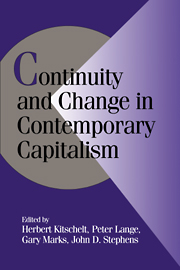Book contents
Introduction
Published online by Cambridge University Press: 05 June 2012
Summary
The point of intellectual departure for this volume is the end of the postwar period of rapid growth and the breakdown of postwar social contracts and institutional arrangements that were the central topics of comparative political economy from the 1960s to the 1980s. In the two decades following World War II, advanced capitalist democracies were characterized by rapid economic growth, expanding welfare state entitlements, apparently frozen party systems, class- and religion-based voter alignments, highly institutionalized systems of industrial relations, and a stable, if tense, system of international relations. Many, perhaps most, social scientists regarded these as permanent features of modern society. Not one of these features survived the decades of the 1970s and 1980s. The initial expression of the transformation that took place was “stagflation,” a phenomenon that stimulated several academic conferences and a host of papers that concluded that countries with social democratic governments and highly centralized systems of national collective bargaining – in short, “neocorporatist” societies – were the most successful in producing low levels of unemployment, modest inflation, and economic growth, and could best defend welfare state entitlements (Goldthorpe 1984; Lindberg and Maier 1985). However, it later became clear that the early 1980s represented merely a temporary holding pattern. In the intervening years we have witnessed a transformation not only of the economies of advanced capitalist democracies, but also of their systems of labor relations, party systems, and voter alignments.
- Type
- Chapter
- Information
- Continuity and Change in Contemporary Capitalism , pp. 1 - 8Publisher: Cambridge University PressPrint publication year: 1999
- 1
- Cited by



